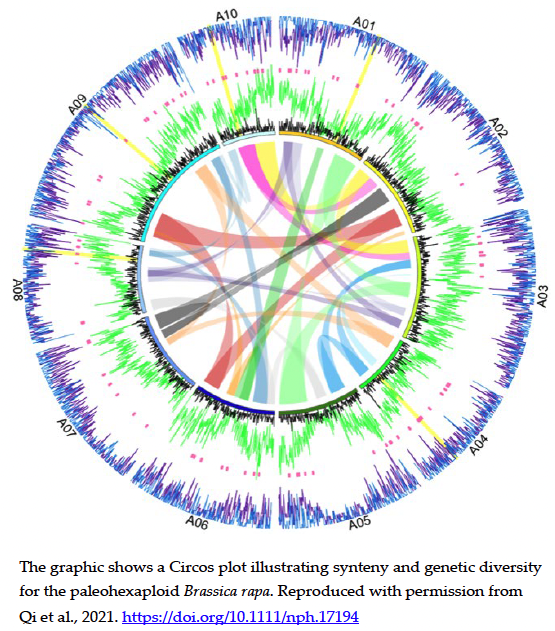Special Issue Call for Papers: AJB and APPS
Twice as Nice: New Techniques and Discoveries in Polyploid Biology
Proposal Deadline Extended: February 15, 2023
 The causes and consequences of polyploidy, or whole-genome duplication, are active areas of research in the plant sciences. In recent years, this research has advanced rapidly due to new methods to both generate and analyze data from polyploids. The advancement of genome sequencing has opened new avenues in understanding polyploidy at phylogenetic and population scales while driving and complementing innovations in theory and empirical work in the lab and in the field. Recent research has explored the ecological and evolutionary dynamics of polyploid establishment, the complex macroevolutionary impacts of polyploidy, and how polyploidy influences both molecular biology and physiology. Researchers working on polyploid or mixed-ploidy systems have a variety of approaches to choose from, but analyzing the complex whole-genome or reduced-representation data is not a trivial task. The community is therefore faced with an abundance of riches in terms of data and abundant opportunities to develop, compare, and apply novel methods to make the most of the information. In these joint issues of the American Journal of Botany and Applications in Plant Sciences, we seek to showcase new methods and resources available for research into polyploidy and also the substantial advances in our understanding of polyploid taxa from across a range of studies.
The causes and consequences of polyploidy, or whole-genome duplication, are active areas of research in the plant sciences. In recent years, this research has advanced rapidly due to new methods to both generate and analyze data from polyploids. The advancement of genome sequencing has opened new avenues in understanding polyploidy at phylogenetic and population scales while driving and complementing innovations in theory and empirical work in the lab and in the field. Recent research has explored the ecological and evolutionary dynamics of polyploid establishment, the complex macroevolutionary impacts of polyploidy, and how polyploidy influences both molecular biology and physiology. Researchers working on polyploid or mixed-ploidy systems have a variety of approaches to choose from, but analyzing the complex whole-genome or reduced-representation data is not a trivial task. The community is therefore faced with an abundance of riches in terms of data and abundant opportunities to develop, compare, and apply novel methods to make the most of the information. In these joint issues of the American Journal of Botany and Applications in Plant Sciences, we seek to showcase new methods and resources available for research into polyploidy and also the substantial advances in our understanding of polyploid taxa from across a range of studies.
AJB seeks submissions on topics related to polyploid biology. We welcome new analyses as well as reviews and meta-analyses that explore questions related to polyploidy. Topics of interest include:
- Macroevolutionary analyses of polyploidy across the plant phylogeny, including comparative analyses of genomes, diversification, biogeography, and other questions within and across clades
- Genome evolution in polyploid species, including analyses of fractionation and diploidization
- Population genetic analyses of polyploid and diploid species, including analyses of genetic diversity, mutation, recombination, and selection
- The role of polyploidy in crop domestication and improvement
- The ecological dynamics of polyploid and diploid species
- Experimental evolution studies of polyploid species
APPS is particularly interested in submissions on the topics listed below. We welcome new techniques, but also reviews and thorough comparisons of existing techniques to point the community to best practices.
- Novel polyploid genomes and databases of genome size/chromosome counts in understudied flora or taxonomic groups
- Cytological and other methods for determining ploidy levels from fresh and preserved samples
- Software or comparisons of existing software to illustrate best practices for data analysis in polyploids, for both individual genomes and populations
- Methods for placing polyploidy events onto a phylogeny and using paralogs in species tree analyses
- New approaches to dealing with paralogs and other complex genomic features in reduced representation genomic data (e.g., sequence capture and RAD-seq)
- New techniques for detecting allopolyploidy, subgenome dominance, and homeologous exchange
How to submit a proposal: Authors interested in contributing to these special issues should email a proposal that includes a tentative title, tentative author list, preferred journal (AJB or APPS), and a 200–300-word abstract.
For APPS, the proposal should also include the proposed manuscript category, and the abstract should explicitly address the topics of the special issue and explain how the proposed manuscript advances techniques, software, or resources in the plant sciences (note that reviews comparing different techniques are also welcome).
AJB proposals should be sent to ajb@botany.org. APPS proposals should be sent to apps@botany.org.
The deadline for proposal submission is January 31, 2023. Proposals will be reviewed by the Editors-in-Chief and Guest Editors; authors will be notified by March 1, 2023, as to whether their proposal was accepted. Proposal submissions from early-career researchers are particularly encouraged.
Authors whose proposals are accepted should submit their manuscript by September 1, 2023. Note that acceptance of a proposal does not guarantee the eventual acceptance of the manuscript, as all manuscripts will be rigorously peer-reviewed and held to the standards of the journal. The target date for publication of the special issue is mid 2024.
AJB is a hybrid journal, with an option for Open Access. APPS is a fully Open Access journal; reduced article publication charges (at the BSA member rate) are available for papers accepted for publication in the special issue. A limited number of APC waivers are available for authors without funds. Inquire for more information.
See the Author Guidelines for details on journal scope, article types, and manuscript preparation: AJB and APPS.
Sincerely,
Michael Barker (University of Arizona)
Kelsey Glennon (University of the Witwatersrand)
Agnieszka Golicz (Justus Liebig University Giessen)
Yuannian Jiao (Institute of Botany, The Chinese Academy of Sciences)
Michael McKain (University of Alabama)
Ya Yang (University of Minnesota, Twin Cities)
Special Issue Editors